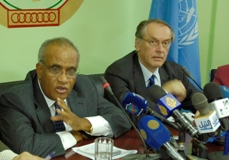Mediators urge Security Council to get tougher in Darfur
June 12, 2008 (ADDIS ABABA) — The UN Security Council should get tougher in its efforts to resolve the Darfur conflict, mediators said Thursday, warning of a worsening humanitarian and security situation on the ground.
 “We can’t deal with the problem alone,” said Jan Eliasson, UN special envoy to the region.
“We can’t deal with the problem alone,” said Jan Eliasson, UN special envoy to the region.
“We can’t reach full force without the weight of the Security Council (members). They have to exercise more willingness to get involved. The Security Council should take seriously that the resolution is not being implemented,” he told AFP in an interview in Addis Ababa.
The Khartoum government and Darfur rebel factions have defied numerous UN resolutions since the conflict erupted in 2003 when tribal insurgents started to demand a fair share of national development funds.
The Council’s ambassadors in early June visited an undermanned and ill-equipped UN-led peacekeeping force and victims in Darfur and expressed frustration over dire insecurity in the region the size of France.
Eliasson’s co-mediator, African Union special envoy Salim Ahmed Salim, agreed, telling AFP that the absence of peace talks was worsening the situation on the ground.
“The situation on the ground is still deteriorating. The peace process has not reached far because of the lack of negotiations,” Ahmed added.
Ahmed was hopeful that the peacekeeping force, currently standing at 9,000 men and women on the ground, could reach the target by year-end.
“The briefings that we are getting tell us that we’ll get 80 percent of total deployment by the end of the year.”
The joint UN-African Union force known for Darfur, known as UNAMID, is to total 26,000 members tasked with protecting the civilian population of a region.
The pair, in Addis Ababa to brief the AU Peace and Security Council on the latest developments, were alarmed by the World Food Programme threat to cut relief flights in Sudan from June 19 unless it receives 20 million dollars by Sunday.
“It is a matter of concern that aid flights have been scaled down,” Ahmed added.
The efforts of Eliasson and Ahmed were frustrated in October 2007 when peace talks they organised in Libya failed after some rebel factions refused to participate. Previous talks in Nigeria, Tanzania and South Sudan also failed.
In addition to logistical bottlenecks, wrangles between Khartoum and the International Criminal Court over the fate of Sudan’s state secretary for humanitarian affairs Ahmed Haroun and Janjaweed militia leader Ali Kosheib — accused in 1997 of 51 counts of war crimes and crimes against humanity — have affected cooperation.
The ICC has asked the UN Security Council to step in and help, but Sudan’s leader Omar al-Beshir has dismissing the pressure as an unjust campaign against his nation.
Instead, Sudan on Tuesday said it would ask Interpol to arrest 20 Darfur rebel leaders accused of involvement in an unprecedented attack on the capital last month. The Sudanese army says 220 people died, including 100 soldiers and 34 civilians, two of them Egyptian.
The UN says up to 300,000 people have died from the combined effects of war, famine and disease and more than 2.2 million have fled their homes since the Darfur conflict broke out in February 2003.
The Darfur conflict broke out when ethnic minority rebels took up arms against the Arab-dominated regime and state-backed Arab militias, fighting for resources and power in one of the most remote and deprived places on earth.
(AFP)
